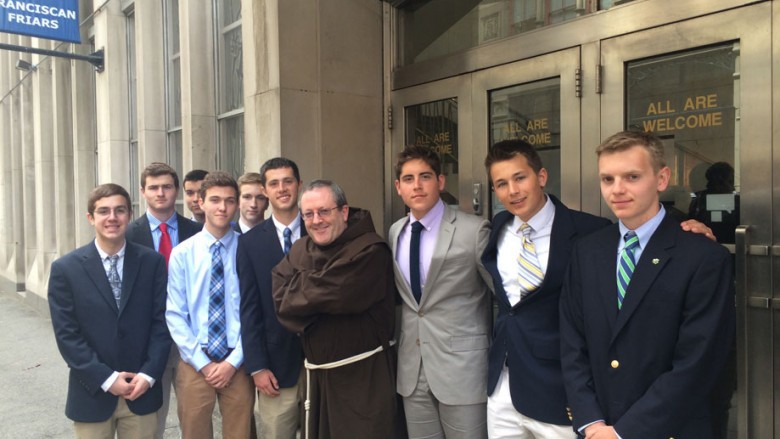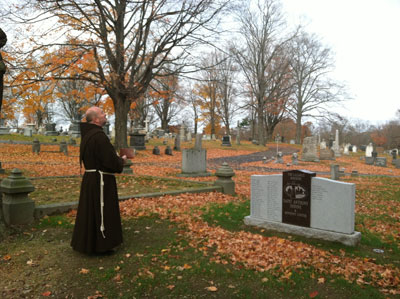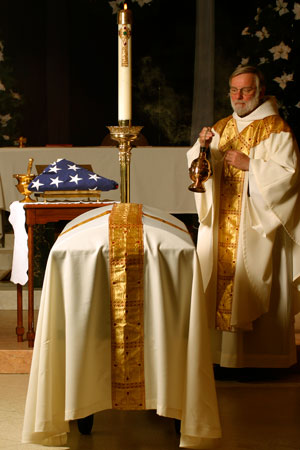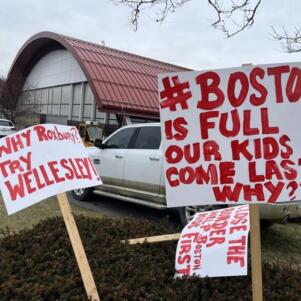Abandoned but not forgotten: The Lazarus Ministry
By Mary McCleary | November 27, 2015, 10:01 EST
 Fr. Thomas Conway, OFM with a group of volunteer pall-bearers from BC High. (Courtesy of St. Anthony’s Shrine)
Fr. Thomas Conway, OFM with a group of volunteer pall-bearers from BC High. (Courtesy of St. Anthony’s Shrine) The Lazarus Ministry at St. Anthony’s Shrine in Boston is an oasis of hope in a harsh cultural climate that dismisses “inconvenient” human life. One of the great human tragedies is to die alone and abandoned. But the self-effacing friars and volunteers at the church respond generously whenever the Boston Medical Examiner’s office calls for help with an unclaimed deceased person. Their discreet ministry provides funerals and burials for the homeless, the poor, and abandoned infants.
Although they are Catholic, the Lazarus Ministry is open to anyone in need, irrespective of religion, nationality, or economic status. They are “dedicated to the entire person, in death and in life.” It is an inspiring witness that each human life is worthy of our respect, even after death. The Franciscan friars stand by people whom they never knew and affirm the intrinsic value of their existence, if only in memory.
Their sensitive and respectful care is shown each time they receive a body from the Medical Examiner. The ministry assumes full responsibility for the deceased, and provides their services free of charge. They seek out partners like the Dolan Funeral Home, which helps with the services and burials, and frequently donates coffins as well.
The organization shows reverential concern for the lives and circumstances for the deceased. For instance, with homeless veterans they acknowledge their service with a military funeral at the Bourne National Veteran’s Cemetery in Cape Cod. Often, they are the sole representatives to accompany the person. Managing Director Julie Ogden says, “In the case of street homeless veterans, we have someone standing beside their casket at the burial to say ‘thank you for your service.’ ”
Among the most moving cases are deceased babies. Ogden explains that sometimes a drug-addicted mother abandons her dead infant, who often doesn’t survive birth. In other instances, the parents are undocumented immigrants afraid of deportation if they claim the child. Still others come from dysfunctional families.
Without passing judgment on the parents, the Lazarus ministry nevertheless recognizes the particular sorrow of discarding life at its most vulnerable stage. Their delicate treatment is a potent reminder of the fragility of infants.
If the child doesn’t have a name, the ministry provides one. They then coordinate a group of kindhearted volunteers who generously offer their help. One anonymous woman pays for lovely floral arrangements at the funeral. An ensemble of professional musicians also performs at the services.
With sedulous care, the Knitting Connection in Medford provides beautiful blankets to line the infant caskets. Their talented volunteers spend hours knitting, crocheting, and quilting for these babies as well as for other for needy recipients. Another group of volunteers from the Charles River Smockers donates exquisite hand-stitched dresses. Their intricate white garments are often the only clothing the babies will have.
Other donors help the friars obtain burial sites around Boston. These contributors either provide plot donations or send money to purchase them.
The Franciscan friars’ example is moving and effective, because it reminds us that abandonment is never acceptable, either in life or in death.
Fr. Conway, Executive Director of St. Anthony’s, had only been at the shrine for a few months when he officiated at the first infant funeral. There were three babies that day. It was during Advent season before Christmas, and the church was filled with decorations. Fr. Conway recounts, “I was struck by the poignancy of the whole thing. There were many images of the Virgin Mary and Child around, with moving music about belonging to God, and even Julie Ogden stood nine months pregnant as she did the readings. But in the middle of this scene were three abandoned infants. They were lost before they even had a chance to live their lives. It was as if God were saying, ‘they belong to me now.’ ”
By its very nature, a funeral is a public event. Like a baptism or wedding, it is an occasion at which people in a community acknowledge their interdependence. We all have an influence on one another, and need each other’s help to come into this world, form families, and be cared for at death. For that reason, the Franciscan friars’ example is moving and effective, because it reminds us that abandonment is never acceptable, either in life or in death.
Besides being available to perform all the funerals for the Lazarus Ministry, the friars ensure that either one of their members or a representative from the organization attends each burial. They continue to remember the deceased whom they’ve served long after the burials. Every November, they hold a memorial mass for all those who have died the previous year.
“They are not without inherent dignity. We want to make sure there is someone celebrating their life.”
In the spirit of recognizing the individual dignity of each person, the Lazarus Ministry ensures that everyone’s name is on a headstone. No one is left in an unmarked grave. Several times a year, the group also cleans and maintains the gravesites. It is a visual reminder that the deceased should be honored and remembered after they’re gone.
Ogden points out that no matter how impoverished or helpless people are, they deserve our attention and support: “They are not without inherent dignity. We want to make sure there is someone celebrating their life.”

Fr. Barry Langley, OFM blesses a headstone at a Lazarus Ministry cemetery plot. (Courtesy of St. Anthony’s Shrine)
A wonderful group of young people offers their services to the Lazarus Ministry. Dedicated student volunteers from Boston College High School contribute their time as pallbearers. It is by no means an easy task. Since there are no elevators large enough for the coffins, they must carry the caskets up two flights of steep stairs. As the young men develop their social responsibility skills, they give a fine example of maturity, a sense of duty, and a strong spirit.
The Lazarus Ministry’s care for the abandoned dead is a profound testament to the dignity of each person, no matter how destitute or forgotten. It is all the more remarkable because the friars and their volunteers know they’ll never receive gratitude or recognition from their beneficiaries. But their good works go beyond the charitable services they perform, since they give society an extraordinary witness about the meaning and value of every human life.
Contact Mary McCleary at [email protected]












